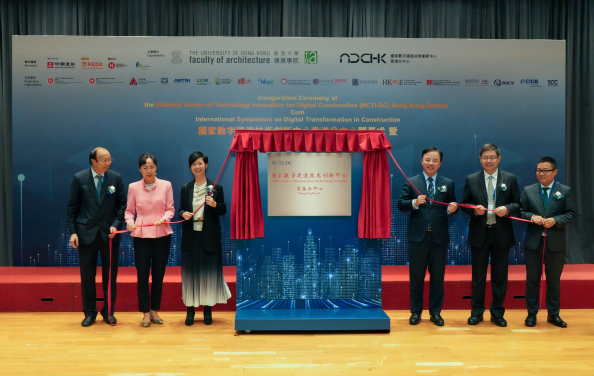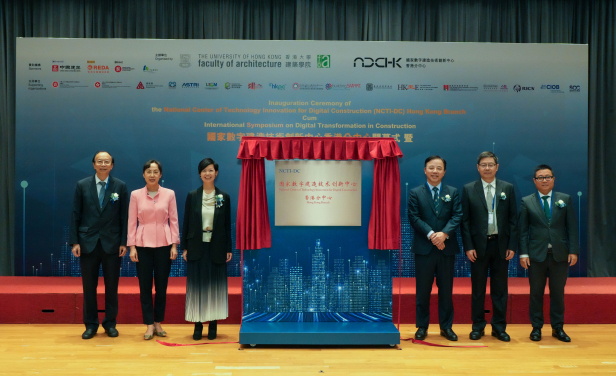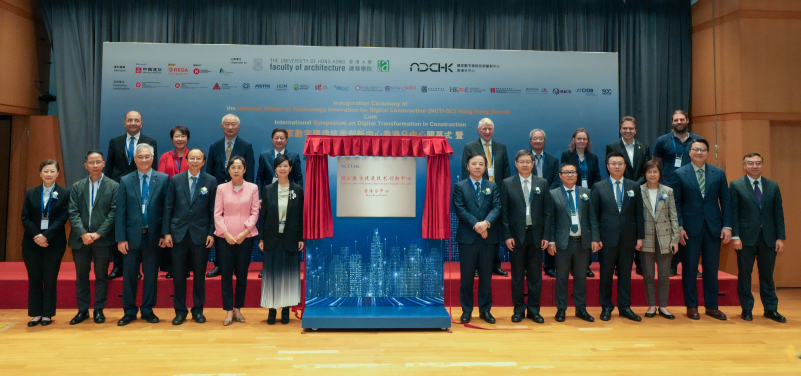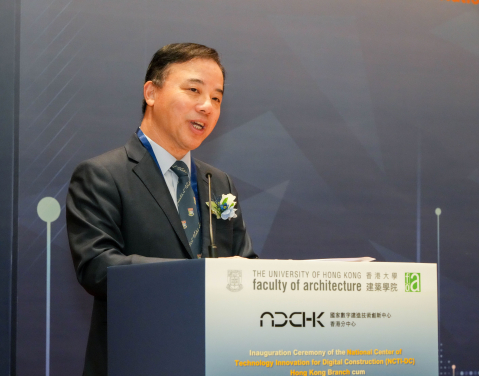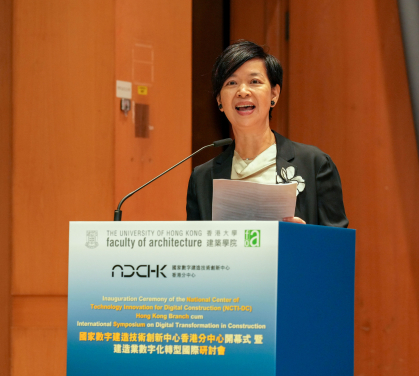Media
HKU launches Hong Kong Branch of National Center of Technology Innovation for Digital Construction
23 Oct 2024
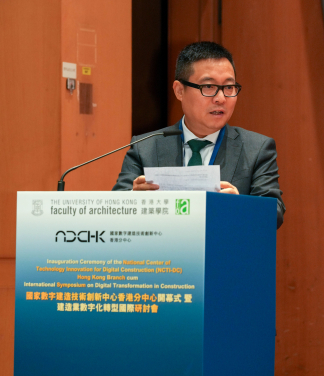
Professor Wilson Lu, Head of the Department of Real Estate and Construction and Director of NCTI-DC Hong Kong Branch
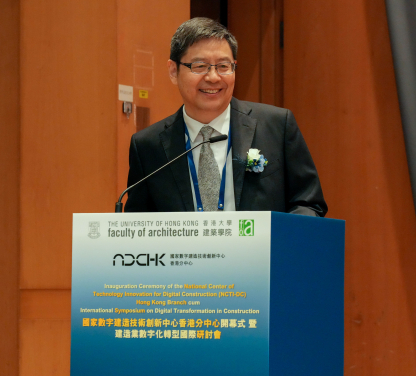
Academician Lieyun DING, Chief Scientist, National Center of Technology Innovation for Digital Construction
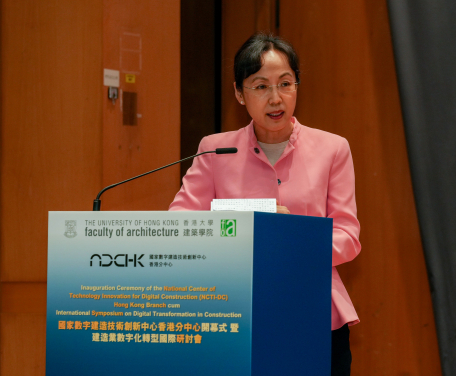
Ms Cheng WU, Deputy Director-General, Department of Educational, Scientific and Technological Affairs, Liaison Office of the Central People's Government in HKSAR
- 1 / 8
- 2 / 8
- 3 / 8
- 4 / 8
- 5 / 8
- 6 / 8
- 7 / 8
- 8 / 8
Leveraging Hong Kong‘s advantages to meet country’s needs and advance digital construction management technologies globally
The inauguration ceremony of the Hong Kong Branch of the National Center of Technology Innovation for Digital Construction (NCTI-DC) was held today (October 23) at Rayson Huang Theatre, the University of Hong Kong (HKU), marking a significant milestone in technological innovations and advancement in digital construction management (DCM) for Hong Kong and HKU.
NCTI was launched by the Ministry of Science and Technology (MOST) of the People’s Republic of China in 2020 as a novel approach to promoting in-depth integration of industries, academia and research and promoting the commercial application of advanced technology, leading the technological directions and influencing the future development at the forefront of the industry. NCTI-DC, established with the approval of MOST, was founded in January 2022 by Professor Lieyun Ding, Academician of the Chinese Academy of Engineering and former President of the Huazhong University of Science and Technology (HUST).
The Hong Kong Branch of NCTI-DC at HKU is the first branch of National Center of Technology Innovation in Hong Kong, as well as the first national engineering branch of the University.
The NCTI-DC Hong Kong Branch is led by Professor Max Shen, Vice-President and Pro-Vice-Chancellor (Research) of HKU, as Chairman of the Committee of Management; Chair Professor Anthony Yeh, Acting Dean of the Faculty of Architecture and Academician of Chinese Academy of Sciences, as Chairman of the Expert Advisory Committee; and Chair Professor Wilson Lu, Director of iLab and Head of the Department of Real Estate and Construction, as Director of NCTI-DC Hong Kong Branch.
It is hosted by iLab under the Faculty of Architecture, HKU. The iLab is an urban big data research hub that takes the opportunities and challenges instigated by the global visions of Smart City and Industry 4.0. Over the years, iLab has made significant breakthroughs in modernising the construction sector in Hong Kong and beyond, and has won a number of academic and industry prizes, including the buildingSMART International Awards 2021, Hong Kong CIC Construction Digitalisation Award 2021, Hong Kong ICT Awards 2022 – Smart Mobility Award (Gold Award), ASCE Journal of Management in Engineering Best Paper Award, as well as two medals at the 48th and 49th International Exhibition of Inventions Geneva.
In response to the challenges facing the construction industry, such as ageing of labour force, low efficiency, safety, and quality control, the NCTI-DC Hong Kong Branch will focus on breakthrough in major bottlenecks of DCM in the entire construction process with six key technical research directions: smart building generative design, remote offsite precast component smart manufacturing and quality inspection, construction supply chain smart tracking, smart jobsite and construction management, smart building facility management, and life cycle digital management platform, with an aim to promote technological innovations and develop leading-edge DCM solutions around traditional and new construction methods. With HKU’s research excellence in DCM technology, in addition to the unique strategic advantage of Hong Kong being a super connector between Mainland China and the world, it is envisaged that this newly launched branch will provide a platform for national and international knowledge exchange in the field of DCM.
To take advantage of Hong Kong’s strength in digital construction R&D, Joint Research Laboratories are set up at the Hong Kong Branch to leverage Hong Kong’s advantages to meet the country’s needs and advance DCM technologies globally. Among the partnered laboratories are: C-Smart Digital Construction Lab of the China State Construction Engineering (Hong Kong) Limited, HKU’s iLab, Construction Informatics Laboratory, Advanced Alloys Laboratory, and Advanced Technologies Institute, as well as City University of Hong Kong’s Sustainable Infrastructure Lab.
New construction technologies and methods, such as MiC (Modular Integrated Construction), require innovative DCM technologies to ensure the quality, safety and speed of construction. Not only can the NCTI-DC Hong Kong Branch propel the city’s innovative and technological development and achieve better integration between the government, industry, academia, research and practical applications; it also combines the scientific research strength of the National Center and its Hong Kong Branch, providing innovative technologies for the digitalisation of the construction and management of public housing, as included in the 2024 Policy Address recently announced by the Chief Executive last week.
Today’s inauguration ceremony was officiated by Academician Lieyun DING, Chief Scientist, National Center of Technology Innovation for Digital Construction; Ms Winnie HO, Secretary for Housing, Housing Bureau; Ms Cheng WU, Deputy Director-General, Department of Educational, Scientific and Technological Affairs, Liaison Office of the Central People's Government in the Hong Kong Special Administrative Region; and Professor Xiang ZHANG, President and Vice-Chancellor, HKU. They together unveiled the plaque of the Hong Kong Branch.
In his speech to address the audience, Professor Zhang said the establishment of the Hong Kong Branch not only signifies an important milestone for Hong Kong and the University of Hong Kong in innovative DCM technology, but also represents the first branch established by National Center of Technology Innovation in Hong Kong, following the deep integration of 'Government, Industry, Academia, Research and Practical Applications' promoted by the Ministry of Science and Technology in 2020, carrying great significance.
Ms Winnie Ho, Secretary for Housing, expressed in her speech high hopes for the establishment of NCTI-DC’s Hong Kong Branch. She looks forward to collaborating with its joint laboratories, leveraging Hong Kong's strengths to contribute to the country's needs and bring research and development achievements to countries along the "Belt and Road" initiative, ASEAN countries, and other countries in need of new housing construction technologies. She also hopes that these technologies can accelerate and improve the progress, output, and quality of public housing construction in Hong Kong, bringing more happiness to local residents, and building them houses and homes.
NCTI-DC and the Joint Research Laboratories of the Hong Kong Branch introduced their research and future directions in the ceremony. To commemorate the grand opening of the NCTI-DC Hong Kong Branch, the inauguration ceremony was followed by a two-day International Symposium on Digital Transformation in Construction, held to foster meaningful and comprehensive discussions on the latest advancements and future trends in the digital transformation of the construction industry.
Internationally renowned scholars and experts have been invited to present their insights and expertise at the Symposium, namely: Professor Xiangsheng Chen of Shenzhen University, Academician of Chinese Academy of Engineering; Professor Dongping Fang of Tsinghua University; Professor Guiwen Liu of Chongqing University; Professor Ioannis Brilakis of the University of Cambridge; Professor Roger Flanagan of the University of Reading; Ar Professor Ada Fung, Founding President of Hong Kong Alliance of Built Asset & Environment Information Management Associations; Professor Timo Hartmann of Technical University of Berlin; Professor Kincho Law of Stanford University; Professor Jennifer Whyte of the University of Sydney; and Chair Professor Wilson Lu, Director of NCTI-DC Hong Kong Branch, HKU.
Official website of NCTI-DC: http://ndc.hust.edu.cn/
Official website of NCTI-DC Hong Kong Branch: https://www.dchk.hku.hk/
For media enquiries, please contact:
Communication and Public Affairs Office, HKU
Melanie Wan (Tel: 2859 2600 / Email: melwkwan@hku.hk)
Jaymee Ng (Tel: 3910 3612 / Email: ngjaymee@hku.hk)
Kenneth Choi (Tel: 3917 2607 / Email: khkchoi@hku.hk)

